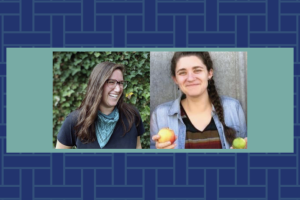
Loam, a member of the 2021-22 Social Innovation Lab cohort, was co-founded by Samantha Novak and Kasey Armstong.
Why did you decide to start this? Where did the idea come from?
Samantha Novak and Kasey Armstrong: About three years after moving back to Baltimore, Sam was struggling to find people who were interested in her professional passion: Whole-systems change. She was yearning for a community of practice committed to exploring, deepening and supporting one another in practicing whole-systems thinking and its application in social change work. Sam sent out an invitation to her alumni group at the Center for Creative Change and began to convene online conversations. Kasey came to the first convening. Over time, while others fell away, Sam and Kasey never stopped meeting.
We loved exploring and experimenting together. We spent years building a strong relationship while we piloted systems-thinking programming with Impact Hub Baltimore’s Skill Shares platform and at WFAN’s annual conferences. We had both experienced the frustration and harm of dysfunctional organizations working on intractable social problems. We’d also found healing and growth by participating in learning communities that were exploring how to create deep, lasting personal and organizational change. We believed in the transformational power of these spaces and wanted to co-create similar opportunities for others.
What constitutes success for Loam?
Success is finding the courage to embrace our daily lives and work as a primary place to practice transformative change. Change requires a commitment to a different way of understanding and being in the world. It is hard to do and even harder to measure.
Success is when we become the artist capturing the moments when we have shifted – with intention and care – how we relate to and treat ourselves, our communities, and our world.
What have you accomplished so far?
Until recently, we had been building this venture alongside full-time work. We designed and facilitated nine workshops and staff retreats centered in applying whole systems to social change with over 280 participants. Our biggest accomplishment at that point was finding our rhythm and strength as a team of two and working toward taking on Loam full-time.
Since officially founding Loam in December, we’ve been focused internally on building our foundations and becoming full-time entrepreneurs. We’ve picked a name and invested in our branding, polished our flagship workshops, completed 20 customer discovery interviews, clarified our impact, signed two new contracts, led ourselves in a three-day strategic planning retreat, got accepted as a fiscally sponsored project under Empowerment Works, submitted four new project proposals and led another four workshops with 55 participants. We’ve been rooting our work and growing in Baltimore.
How can people get involved in supporting you in your venture?
There are lots of ways to get involved with Loam! You can check out our website, follow us on Instagram or LinkedIn, subscribe to our mailing list, or contact us directly to explore opportunities to partner or hire us. We’re still strengthening our network and we’d love to grab a coffee and learn more about you.
This summer, you can also join us for a three-part hiking series in partnership with Discover Charm City. Stay tuned for upcoming dates and registration details.
What do you like most about the Baltimore entrepreneurial community? What would you like to see more of?
We appreciate that the entrepreneurs in Baltimore don’t hesitate to support one another. Community and social capital are such fundamental parts of success. We don’t hesitate to offer one another connections or resources. In our experience, there is a stronger sense of collaboration than competition.
What advice do you have for would-be social entrepreneurs thinking about starting a venture?
This work is really hard. There have been an immeasurable number of times when we’ve felt the tension between the impact and money-making sides of social entrepreneurship. We are still learning how to dance with that tension and we try to embrace those two goals with a sense of curiosity. We suggest finding role models who can help you build your own authentic, values-centered decision-making compass. Along with role models, find peers who understand the joys and challenges of entrepreneurship. This work can feel lonely sometimes. Celebrate and support each other.
Why did you apply to SIL?
The SIL Bootcamp was Sam’s first touchpoint into the Baltimore entrepreneurial ecosystem years ago and she has been a fan ever since. She knew the accelerator program prioritized community-building alongside traditional business education and resources, valued Baltimore-based ventures focused on community-driven solutions, and attracted powerful leaders. If you need any evidence, just take a look at the past cohorts.
We applied for the SIL Accelerator Program because we needed guidance in starting a business. We are experts in designing and facilitating workshops, educating about whole-systems change, and crafting cultures of learning. But we are brand new at founding, running, and scaling a successful venture. We have been so grateful for the concrete business support, the connections to resources and experts, and this cohort of badass entrepreneurs following their passions and growing together.
Read more about Loam here. To learn more about the Social Innovation Lab and the 2021–22 cohort, click here. Join them at the SIL Innovators’ Showcase event, 5–7 p.m. on April 26.